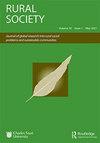What makes stakeholder engagement in social licence “meaningful”? Practitioners’ conceptualisations of dialogue
IF 1.1
Q3 SOCIOLOGY
引用次数: 8
Abstract
ABSTRACT Social licence to operate (SLO) acknowledges the need for extractive industries to move beyond regulatory requirements into social accountability, which requires engagement between companies and their stakeholders. Engagement efforts point to dialogue as being integral for increasing the inclusivity of, for example, land-use decision-making in rural governance. Since little research explores what constitutes “constructive dialogue”, this research empirically explored how dialogue is conceptualised by expert engagement practitioners in SLO. Practitioners conceptualised constructive dialogue as both a threshold for, and an indicator of, social licence. This finding aligns with academic theorisation of dialogue wherein dialogue represents a collaborative form of engagement core to the development of SLO. Practitioners suggested dialogue is most commonly, and potentially problematically, operationalised as a goal-oriented process, aligning with previous work suggesting a “spectrum of dialogue” from strategic to learning-oriented. Contextual realities, such as time and costs, define where implemented dialogue practice ultimately falls. Analysis of practitioners’ views suggests industry and academia may consider future engagement practice and research in light of the centrality of reciprocal dialogic processes for increasing the inclusivity of SLO processes.是什么让利益相关者参与社会许可“有意义”?实践者对对话的概念
社会经营许可证(SLO)承认采掘业需要超越监管要求,承担社会责任,这需要公司及其利益相关者之间的参与。参与工作指出,对话是提高农村治理中土地使用决策的包容性不可或缺的组成部分。由于很少有研究探讨什么是“建设性对话”,本研究从经验上探讨了专家参与从业者如何将对话概念化。从业者将建设性对话概念化为社会许可的门槛和指标。这一发现与对话的学术理论一致,其中对话代表了一种协作形式的参与,是语言学习发展的核心。从业者建议,对话是最常见的,并且可能存在问题的,作为一个目标导向的过程进行操作,与先前的工作一致,建议从战略到学习导向的“对话范围”。上下文现实,例如时间和成本,定义了实现的对话实践最终落在哪里。对从业者观点的分析表明,工业界和学术界可以根据互惠对话过程的中心地位来考虑未来的参与实践和研究,以增加SLO过程的包容性。
本文章由计算机程序翻译,如有差异,请以英文原文为准。
求助全文
约1分钟内获得全文
求助全文

 求助内容:
求助内容: 应助结果提醒方式:
应助结果提醒方式:


